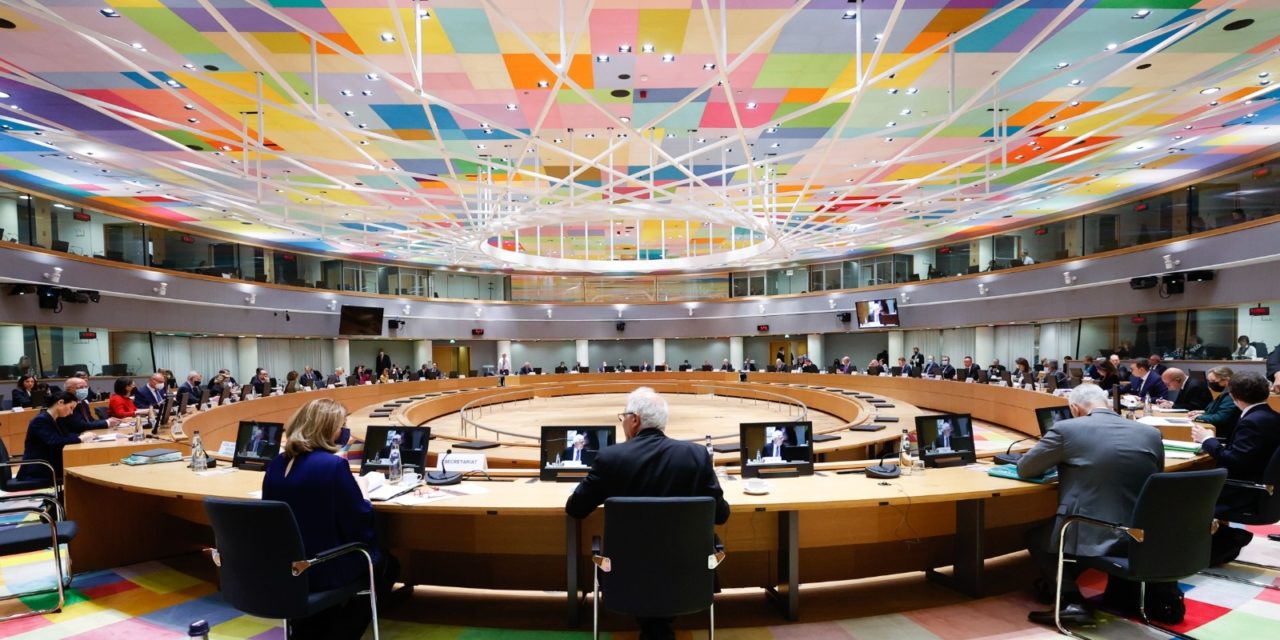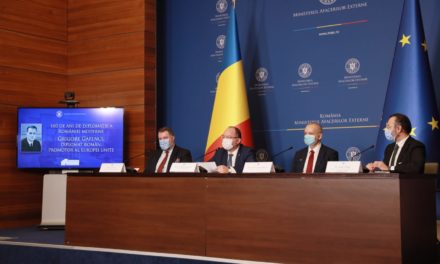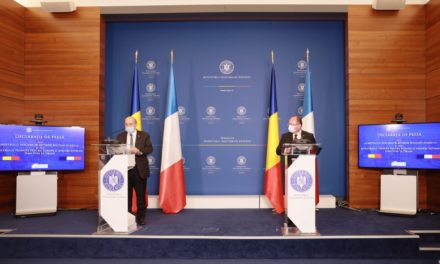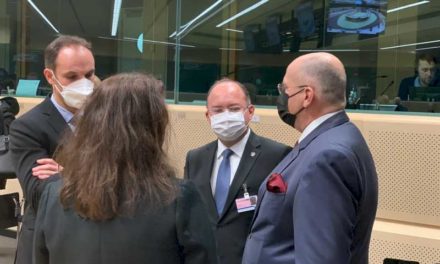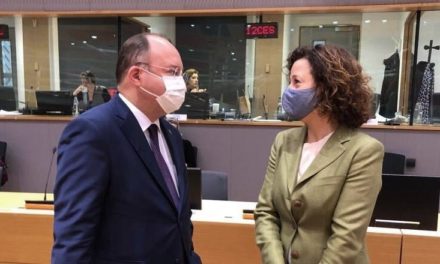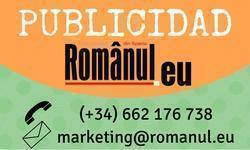Ministrul afacerilor externe Bogdan Aurescu l-a primit marți, 19 iulie 2022, pentru consultări politice, pe ministrul afacerilor externe și al apărării al Republicii Irlanda, Simon Coveney, aflat în vizită oficială la București, la invitația șefului diplomației române.
Întâlnirea a oferit prilejul unui schimb aprofundat de opinii cu privire la stadiul și perspectivele de dezvoltare a relațiilor foarte bune româno-irlandeze, inclusiv în ceea ce privește aprofundarea și intensificarea dialogului politic bilateral. Totodată, au fost abordate modalitățile de identificare a unor noi oportunități de stimulare a cooperării economice și sectoriale dintre cele două țări, precum educația, turismul și securitatea cibernetică.
Cei doi oficiali au salutat, totodată, contribuția semnificativă a comunității române din Irlanda, bine integrată în societatea irlandeză, la dezvoltarea relațiilor bilaterale.
De asemenea, cei doi miniștri au discutat cele mai importante evoluții în plan european și au pus accentul asupra priorităților comune pe agenda europeană, inclusiv în ceea ce privește procesul de extindere al UE sau privind subiectul relațiilor Uniunii Europene cu Regatul Unit, mai ales în contextul implementării Protocolului dintre Uniunea Europeană și Regatul Unit privind Irlanda de Nord.
Nu în ultimul rând, consultările au vizat, în detaliu, implicațiile agresiunii Federației Ruse împotriva Ucrainei, cu accent asupra evoluțiilor în plan securitar, umanitar și economic, precum și implicațiile în plan regional, cu accent pe situațiile de criză generate de invazie și implicațiile directe la adresa securității și rezilienței statelor din regiune, în special Republica Moldova.
La finalul consultărilor, ministrul Bogdan Aurescu și ministrul Simon Coveney au susținut o conferință comună de presă, disponibilă în format video aici: https://www.mae.ro/node/59262.
Transmitem, mai jos, transcrierea declarațiilor de presă ale ministrului afacerilor externe Bogdan Aurescu și ale omologului irlandez:
Ministrul afacerilor externe Bogdan Aurescu:
Bună ziua!
Vă mulțumesc pentru prezență. Îmi face o deosebită plăcere să urez ,,bun venit” în România colegului și prietenului meu, domnul ministru Simon Coveney. Dear Simon, welcome to Romania! Welcome to the Ministry of Foreign Affairs!
Am avut astăzi discuții foarte substanțiale, foarte concrete, și am putut să vorbim despre foarte multe subiecte privind cooperarea noastră în plan bilateral, dar și la nivel european și internațional, mai ales în contextul evoluțiilor de securitate din Ucraina.
De asemenea, vreau să spun, de la bun început, că vizita domnului ministru reconfirmă nivelul foarte bun al relațiilor dintre România și Irlanda, care sunt bazate pe aceleași valori – valori democratice, pe interese comune și, mai ales, pe faptul că suntem membri dedicați ai Uniunii Europene.
Am apreciat, împreună cu domnul ministru, contribuția comunității românești din Irlanda la întărirea relațiilor noastre bilaterale, precum și la dezvoltarea societății și economiei irlandeze. Și vreau să îi mulțumesc și cu această ocazie pentru modul în care Irlanda sprijină integrarea membrilor comunității românești în societatea irlandeză.
De asemenea, am discutat astăzi și despre cum să procedăm pentru a dezvolta relațiile noastre economice. Avem schimburi comerciale care sunt în creștere, dar nu este suficient. Chiar dacă anul trecut am înregistrat o creștere cu aproape 36% față de anul anterior, avem încă multe de făcut pentru a dezvolta aceste relații economice, pentru a dezvolta investițiile reciproce. Dar, în același timp, există și domenii care promit pentru dezvoltarea acestor relații – mă refer aici la turism, educație, securitate cibernetică și multe alte domenii, care ar putea să fie exploatate, spre beneficiul comun al celor două economii.
De asemenea, am discutat despre subiectele de pe agenda europeană, care interesează atât România, cât și Irlanda.
Suntem două state care sprijină puternic politica de lărgire a Uniunii Europene. Mă bucur că, astăzi, a avut loc la Bruxelles prima Conferință Interguvernamentală privind deschiderea negocierilor cu Macedonia de Nord și cu Albania. Cred că este un pas foarte important, pe care îl salut, un pas care arată valoarea strategică a politicii de extindere a Uniunii Europene, mai ales că acest pas vine după ce Consiliul European, la finalul lunii iunie, a luat decizia acordării statutului de stat candidat pentru Ucraina, pentru Republica Moldova și, în același timp, a reconfirmat perspectiva europeană pentru Georgia.
Desigur, am discutat și despre subiectul relațiilor Uniunii Europene cu Regatul Unit, mai ales în contextul implementării Protocolului dintre Uniunea Europeană și Regatul Unit privind Irlanda de Nord. Am reiterat, cu acest prilej, susținerea fermă a României pentru poziția Uniunii Europene de a rezolva problemele apărute în sfera de aplicabilitate a Protocolului, prin utilizarea cu flexibilitate a mecanismelor oferite de Protocol și am exprimat, de asemenea, încrederea în acțiunile Comisiei Europene în acest sens. Te asigur, dragă Simon, de întreaga solidaritate a României în acest dosar.
De asemenea, am amintit colegului meu și faptul că România continuă să urmărească cu maximă atenție situația cetățenilor români din Regatul Unit, având în vedere comunitatea deosebit de numeroasă din această țară.
Desigur că un subiect principal al discuțiilor noastre l-a reprezentat situația de securitate din Ucraina, cu accent pe implicațiile la nivel european, dar și la nivel euroatlantic și global.
Situația aceasta generată de războiul ilegal și nejustificat, ilegitim al Rusiei împotriva Ucrainei a produs efecte multidimensionale și, în acest sens, am discutat astăzi și despre sprijinul pe care România l-a acordat Ucrainei în plan umanitar, sprijinul pe care îl acordă pentru tranzitul cerealelor ucrainene prin România. Și, de asemenea, am discutat despre importanța de a continua politica de sancțiuni a Uniunii Europene, de a continua presiunea internațională asupra Rusiei, într-un mod coordonat, într-un mod unitar.
De asemenea, am avut un schimb foarte consistent de opinii cu privire la situația din Republica Moldova. Mă bucur că de aici, de la București, domnul ministru va efectua o vizită la Chișinău. Este o vizită de care Republica Moldova are nevoie. Republica Moldova are nevoie de cât mai mult sprijin internațional. Și, în acest context, am informat și despre rezultatele foarte bune pe care Conferința privind Platforma de Sprijin pentru Republica Moldova le-a avut vineri, când am găzduit această reuniune la București: 615 milioane de euro, din care peste 432 milioane de euro în granturi, reprezintă sprijinul financiar pe care l-am strâns vineri și, de asemenea, foarte important, un angajament puternic în sprijinul efortului de reformă pe care autoritățile de la Chișinău și l-au asumat, efort de reformă care are și mai multă relevanță în contextul benchmark-urilor, obiectivelor pe care Opinia din 17 iunie a Comisiei Europene, prin care s-a propus acordarea statului de candidat, le-a fixat pentru Republica Moldova. Și am discutat despre importanța sprijinirii Republicii Moldova, pentru a se apropia în mod ireversibil de Uniunea Europeană, cu toate provocările pe care Republica Moldova le are de înfruntat.
De asemenea, vom continua discuția noastră și după această conferință de presă, pentru că sunt multe alte dosare, extrem de importante, cu privire la care avem poziții similare. Și cred că este important să continuăm să ne coordonăm, mai ales în contextul în care Irlanda deține, în acest moment, calitatea de membru nepermanent în Consiliul de Securitate al ONU.
În încheiere, vreau să îi mulțumesc foarte mult domnului ministru pentru vizita pe care o face în România, pentru discuțiile foarte bune pe care le-am avut și, de asemenea, să îmi exprim convingerea că această vizită va acorda un nou impuls relațiilor noastre, care sunt deja foarte bune.
Domnule ministru, aveți cuvântul.
Ministrul afacerilor externe și al apărării din Republica Irlanda, Simon Coveney:
Thank you very much, Bogdan, I am very pleased to be here today.
Can I just say that the hospitality and the access that we have received today really is a signal of the value of this relationship. This morning, our first meeting was with Prime-minister Ciucă, this afternoon we had a meeting with President Iohannis and, of course, now a meeting with the Foreign Minister, with Bogdan. All of the meetings were substantial and detailed.
The reason that I am here is to develop further the already close relationship and friendship between our two countries, but also to express solidarity with the leadership that Romania has been showing since the Russian aggression in Ukraine began. I think that the leadership of your country has been remarkable in recent months, under extraordinary pressure, but not only to respond to human suffering on an enormous scale – close to 1.7 million people have fled from Ukraine to and through both Moldova, but in particular Romania. More than 80.000 of them have stayed here, under your protection and support.
But also the role that Romania now plays in the context of trying to get grains and other goods out of Ukraine, to the rest of the world. Half of all the grain that has come out of Ukraine to date, since the war begun, has come through Romania, and the infrastructure that you are putting in place at short notice, to try and ensure that the impact of this war on global food security is limited to the greatest extent possible by pro-activity here, to try to free up supply routes to the rest of the world.
The role you play in NATO, even though Ireland is not a NATO member state, I know has only been enhanced by the role that you have continued to play during this war. But we are responding together. Countries with very different histories and very different backgrounds and very different relations with Russia, but we are responding together in the EU. It’s really a challenge to our way of life. Ukraine is currently fighting for its very existence. Ukrainians are giving their lives for the future that they want for their children in the context of what the EU has to offer: freedom, democracy, respect for human rights, respect for dignity and minorities, economic opportunities for trade and cooperation partnership and most importantly, perhaps, the political stability that is the basis for all of that, that EU membership and the solidarity that comes with that EU membership provides.
And so, you know, when we are talking about the consequences in our own countries, of sanctions that are needed to try and bring this war to an end, when we talk about the burden of supporting incredibly vulnerable refugees, coming from Ukraine, when we talk about what we are trying to do, what the UN Security Council, what the EU, what NATO and what many other international partners are trying to do in terms of supporting Ukraine, we are supporting Ukraine, but we are also supporting a way of life that we believe in, that is worth fighting for, in the context of the European Union and its future.
That is why also Ireland and Romania together are such strong supporters of enlargement. I have seen my own country in my lifetime be transformed by EU membership. I was born the year Ireland decided to join, by referendum. And in those 50 years, my country has become unrecognizable from where we were 50 years ago. And that is because of the opportunity and the stability that EU membership has provided. And we want that for North Macedonia, we want that for Albania, we want that for Moldova, we want that for Ukraine, we want that for Georgia in the future and indeed, the other Western Balkans countries.
And believe me, we also know the impact, as I know you do, that the European Union brings and can deliver in terms of peace process, peace processes post-conflict. It’s a powerful force for good and peace and that is why the role of the European Union in this conflict in Ukraine is now so important along with our allies, of course, on the other side of the Atlantic and from the other parts of the world. So for all of those reasons Ireland, we are a non-NATO member state, we are not militarily aligned, but believe me we are not neutral on this conflict and we will continue to support the Ukrainian militarily, we will continue to provide humanitarian support and assistance, we will continue to support.
So far, 42.000 Ukrainians have chosen to come to Ireland and are living with us, in many cases in our homes, and we expect that many more will come and we will continue to support Romania, and Poland, and Hungary, and Slovakia and other countries that are bordering Ukraine, to ensure that we share the political unpractical pressures that this war is forcing into EU. That is what solidarity is about and it’s important that we do that.
That’s why I’m travelling to Moldova this evening, because it is perhaps the country that is under most stress on our continent, obviously outside of Ukraine, as a result of this conflict, and we need to be supportive. And indeed I want to thank you, Bogdan, for the Moldova Support Platform which, as you say, raised more than 600 million euros and most of that in grant aid rather than loans, which is what Moldova needs right now.
So I don’t want to spend much time at a press conference like this talking about the Northern Ireland Protocol, because of the seriousness and the magnitude of the other issues that we all face together. But just to say, I just want to thank you for your solidarity on this issue.
International law matters. International treaties matter. And when a country signs up to an international treaty as the basis for a way forward in terms of relationships, well then respecting those obligations matter, particularly for a country like the United Kingdom, which is a global and significant country. And the example that they give in terms of adherence to their international commitments is important, as well as, of course, the relationship with Northern Ireland and our own peace process and all of the other issues that flow from the United Kingdom leaving the EU and all of its complexity. It’s almost unbelievable that six years later we are still talking about it, but we are. But I hope in the autumn we would be able to find a way of solving these issues through compromise and through partnership, so that the UK and the EU, together, can get back to focusing on what we need to focus on, which is to respond to Russian aggression in Ukraine and all that flows from that, in terms of food security, energy security and broader common defence and security issues that we need to be working together on into the future.
Can I just once again say that this has been a really useful day for me. There are, of course, issues that I hope we can help you on, like your aspirations to join Schengen, for example. And given the way in which you have managed border controls recently, in an incredibly efficient and professional way, I hope that those aspirations to be part of the Schengen area will not be frustrated for much longer. But I say that as a country that’s not a member of Schengen, actually, by choice, because of our relationship with the United Kingdom, which complicates things. But certainly I think your case is an extremely sound one. So, thank you for the friendship. I hope we can build on it.
Not a lot of people know, but, actually, Romanian is the third largest non-Irish population in Ireland. After the UK and Poland, the next largest population is actually Romanians. There’s also a very significant number of Moldovans in Ireland. The combination of Romanians and Moldovans in Ireland is about 130.000 people, which is a lot in a population of just over 5 million. And they are making a fantastic contribution, by the way, to Ireland and its economy – really smart, well-educated young people, predominantly in the tech sector, in the pharma sector, in healthcare provision and much more besides. They are credit to you and to Romania and we’re very lucky to have them. Hopefully, they’ll stay in Ireland but, of course, they may choose to come back here as well in the future.
And so, this has been a good day and I can assure you that the friendship and the solidarity and the collective nature of the relationship between Romania and Ireland will only get stronger in the months ahead, as Europe, together, faces these extraordinary challenges that none of us could’ve predicted even six or seven months ago.
Who would have thought that as an Irish Foreign Minister visiting Kyiv a number of months ago, I would’ve been standing on the edge of a mass grave that 503 bodies had been taken out of in the 48 hours before I arrived? In Europe, in 2022? Unbelievable that we are living through this kind of human misery, given the lessons we thought we’d learnt in the past in terms of conflict and war on this continent. But we are living through it, and it’s a time for solidarity and leadership in the European Union and I have to say there is no country showing that solidarity and leadership more than Romania at the moment, and I really want to thank you for that!

